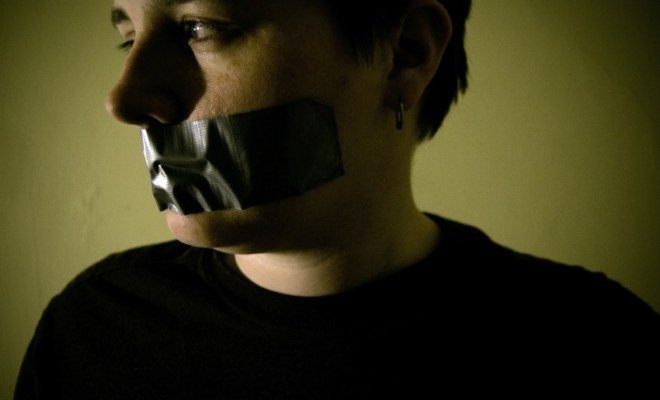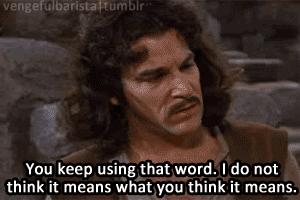 Image courtesy of [Juli via Flickr]
Image courtesy of [Juli via Flickr]
Society and Culture
Let’s All Shut the F**** Up About Political Correctness in a National Security Debate
Last night, Republicans (and Democratic masochists) cozied up to watch the fifth GOP debate of 2015. Hosted by CNN in Las Vegas, it featured nine presidential hopefuls sparring over mostly national security and foreign affairs questions. Some of the back-and-forths got nasty, including Trump vs. Bush, Cruz vs. Rubio, and watching the entire debate vs. my sanity.

But in a debate that focused heavily on the threat of terror, and the horrific actions of the San Bernardino shooters, we heard a lot about political correctness last night. Most notably, according to serious contender Ted Cruz that “political correctness is killing people.” Slamming political correctness has become a new hobby for the Republican party, centered on the concept that Democrats are too scared of offending anyone that we have become weak on security.
Well here’s some political incorrectness for you guys: that line of thought is a fucking excuse, a waste of breath, and a complete misconception of the whole idea of political correctness.

The big flash point appears to be that despite the fact that one of the San Bernardino shooters, Tashfeen Malik, posted messages on social media that advocated for jihad and showed she was radicalized, the Obama administration didn’t catch it. Nevermind the fact that she used a pseudonym with heavy security settings, “that did not allow people outside a small group of friends to see them.” The Obama administration was too busy being politically correct to use its crystal ball to divine that those posts were hers when she applied for a visa.
So what, exactly, were all the Republican candidates that railed against “political correctness” suggesting? That pseudonyms not be able to be used on Facebook or any other social media site? Well that’s a Facebook problem, not a political problem. Or that we should monitor every single person’s social media? That’s awfully Big Brother-ish, and if there are ramifications for someone posting something, well, that could impede on our Freedom of Speech. Or is it just people who don’t look, sound, or pray like the Republican candidates that should be monitored–there was after all, certainly no way we could have stopped Elliot Rodgers, who sent a manifesto outlining his plans before killing seven people and had spent time on multiple forums extolling his hatred for women. But of course, Rodgers, as a non-Muslim young man, was a victim of mental illness, nothing more. There’s no way we could have stopped him.
Or what about Dylann Roof, who shot nine people at a church in Charleston, South Carolina? It’s widely suspected Roof spent time on a white supremacist site called Daily Stormer. The manifesto he wrote uses language pulled almost directly from that site. Should he have been monitored? Or again, were his actions utterly unpredictable, beget out of mental illness and not out of any sort of radicalization that made him believe he needed to slaughter Black Americans?
Can we also talk about the logistical issues of what the Republican candidates were seemingly proposing? The average American age 18-24 sends or receive over 100 texts per day. Overall, time spent on Facebook worldwide accounts for 20 percent of all time online. In the U.S., 74 percent of all adults use at least some form of social media—we’re talking 240 million people. Even if we only identify 1 percent of them as even a possible threat–still 2.4 million people–how do we identify those people in the first place? Yes, we have algorithms, but computers can’t interpret tone or intent. So unless we want the NSA to spend its time sorting through Facebook posts, we have some serious logistical issues here–the NSA has had a hard time processing the data it already has. The Republicans on that stage last night wanted you to believe that we have Muslim terrorists writing “I’m going to commit an act of terror” on their Facebook pages and that the Obama administration is ignoring it, but that’s simply not true.
The internet is an unprecedented thing that we have now–the concept that we have access to this kind of massive personal information on people and their thoughts. We do need to figure out how to optimize policies in a way that will best help with national security. But the idea that all that’s stopping us from accessing all the answers about terrorism is “political correctness” doesn’t recognize the huge logistical undertaking proposed, the potential Freedom of Speech issues, the anonymity the internet provides, or the fact that the government maybe shouldn’t have access to every corner of it. This debate isn’t black and white–it’s significantly more nuanced than that. It’s not just about flipping a “political correctness” switch and suddenly being able to see everyone’s posts (particularly if they’re Muslim) and pinpoint terrorist attacks. And the fact that so many of the Republican candidates last night appeared to think that was the case indicates that they either don’t understand the internet, or are trying to score cheap political points. Given last night’s totally off-base contentions, I’d be surprised by neither.









Comments